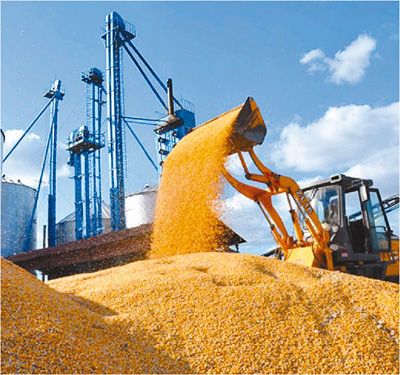
 |
| (File Photo) |
Key Words: grain; grain imports; wheat; corn;rice
Related Reading:
>> Imports of major grains surge in first 10 months
>> China's grain market remains stable amid global fluctuations
China imported nearly 10.8 million tons of wheat, corn, and rice in the first 11 months of 2012, up nearly 295 percent from a year earlier. Certain people thus claimed that the country's grain self-sufficiency rate may drop below 95 percent, and the surge in its grain imports may threaten global grain supplies.
Experts refuted the groundless claim, adding that increased grain imports have not damaged China's grain security. The increase in grain imports is a normal phenomenon in an open market, and should be mainly attributed to structural factors. In order to ensure adequate grain supplies, the country should continue to maintain self-sufficiency in staple foods, moderately import foreign grain, and make full use of domestic and foreign market resources.
Imports rise nearly three times
China has become the world's second largest importer of rice and barley due to the surge in grain imports last year, and ranked in the top-10 corn and top-20 wheat importers in the world. Certain people are worried that it may pose a threat to China's grain self-sufficiency, and foreign countries are worried that the country's grain demand may lead to global food shortages.
Shen Danyang, a spokesperson for the Ministry of Commerce, said that China has fulfilled its WTO accession commitments, and set import quotas for wheat, corn, and rice according to security and possible impact on global markets. The country's imports of the three types of grain in the first 11 months of last year only accounted for less than 50 percent of their combined import quotas, and were within a reasonable range despite the sharp increase.
Cheng Guoqiang, a researcher at the Development Research Center of the State Council, said that China imported 10 million tons to 13 million tons of wheat alone each year between the mid-1980s and mid-1990s when the country suffered tight grain supplies, so there is nothing “crazy” about importing 13.4 million tons of grain in the first 11 months of 2012.
The amount just accounted for nearly 5 percent of global grain trade totaling 280 million tons, 100 percent of South Korea's annual grain imports, 60 percent of Japan's annual grain imports, and nearly 3 percent of China's annual grain consumption of 520 million tons. It is statistically pointless paying too much attention to year-on-year data, said Cheng.

Read the Chinese version: 中国粮食进口“威胁论”太夸张(热点聚焦)
Source: People's Daily Overseas Edition; Author: Wan Qian
















 Beijing style: Duck, opera, fog and cough...
Beijing style: Duck, opera, fog and cough...


![]()
